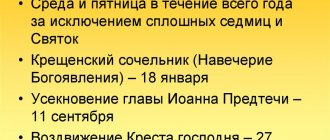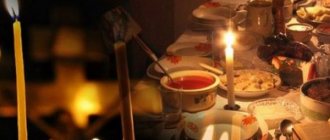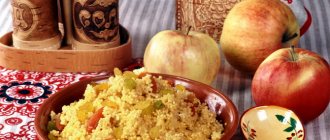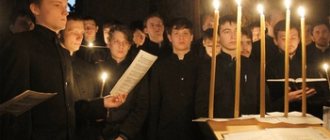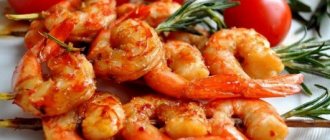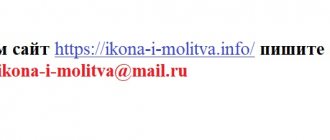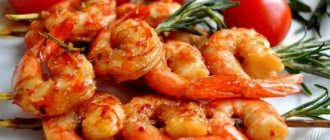People nowadays don't just think about God. They rush towards it spiritually, trying to the best of their ability to adapt their lives to the rules outlined by the canons of faith. Sooner or later, everyone comes to the need to observe Lent. For a layman, the requirement is complex, sometimes exorbitant. Especially if you focus on the monastery charter. However, not everything is as it seems. Let's figure it out.
The meaning of the post
It is necessary to understand that refusing food is not a diet, much less a punishment. Lent for a layman should become a time of spiritual purification, first and foremost. This is an opportunity to isolate yourself, to break away from the desire to consume that is widespread in modern times. Advertising and a variety of products sometimes crowd out the very realization of the Lord from the minds. And Lent for a layman can be an opportunity to get away from this “constant race for benefits.” After all, happiness, as almost everyone finds out, does not depend on material wealth. To understand this, to realize it with your heart, is the goal of Great Lent. You should also understand that its rules, naturally, are defined quite unambiguously. However, there are many “indulgences” that those who wish to take advantage of. These are not “loopholes for clever people.” Rather, they are the mercy of the Lord for those who are weak in spirit, and in body too. Just don’t approach this unique test with despondency. This is not at all what Lent was invented for. The rules for lay people are not strict. In any case, a person will not die from hunger, but he will have time to think.
Why do Orthodox Christians fast on Wednesday and Friday?
In addition to the four multi-day fasts (Christmas, Great, Apostolic and Assumption), there is a Christian tradition of weekly abstinence. This is the post on Wednesdays and Fridays. Fasting on Wednesday commemorates the betrayal of Jesus Christ by Judas. On Friday - in remembrance of the suffering on the cross and death of the Savior.
In the 69th Apostolic Canon there is an indication that if a clergyman violated the weekly fast (except in cases of bodily infirmity), he was deprived of his rank. The laity were excommunicated from the Church.
Not according to the charter, but according to conscience
If you ask a clergyman what Lent means for a layman, he will, as a rule, begin to talk not about products, but about the soul. For example, when talking about various charters, the ministers of the Temple often mention the monastery, and also the Typikon. The fact is that different groups of believers interpreted the rules set out in the Holy Scriptures in their own way.
Monks who give all their thoughts to the Lord are required to observe a very strict fast. This is not required of the laity. Yes, they are subject to some restrictions. But they are all connected more with the work of the spirit, and not with oppression of the stomach. The Kiev abbot Alypiy made the following conclusion: you need to fast according to your conscience, then the Lord will accept your efforts and bless you. Norms and rules are displeasing to the Almighty. It is more important to him when a believer is able to cultivate repentance in himself and illuminate his soul with love for his neighbor. That is, his soul strives for the Lord, and does not torment himself with hunger.
How to fast correctly - tips for beginners
In everyday life, fasting usually means refusing fasting food. In fact, fasting is not limited to food restrictions, but this part of it is important. The meaning of moderation is the voluntary sacrifice that believers make to God. But it must be feasible and conscious; in no case should health be put on the altar. For example, for pregnant women, children, the sick, traveling, and those engaged in very hard work, light dietary restrictions are acceptable. It is advisable to enter into fasting under the guidance of a confessor, especially for the first time. He will determine the measure of fasting and establish the framework of fasting, taking into account the spiritual readiness of the ward. Those who suffer from serious medical conditions, such as diabetes, should discuss their fasting diet with their doctor.
It was customary for early Christians to spend the money they saved on food during Lent for charity.
But fasting cannot be reduced to a series of gastronomic prohibitions; it is needed not because some foods are “bad.” Muslims do not eat “unclean” pork, Hindus refuse beef so as not to kill a sacred animal, Jews have “non-kosher”, forbidden food, but there is nothing like that in Christianity. The true sacrifice that a believer makes while observing fasting is the renunciation of bodily joys and pleasures. A zealous Christian will even refuse Lenten food if it is very tasty or delicacy.
Another thing is a person who decides to fast for the first time. It is important for him to balance his strength and not set himself tasks for which he does not have the courage. For him, the goal should not be to surpass himself, but to test his strength, and most importantly, to maintain control. Fasting disciplines, teaches self-control, and gives the experience of spiritual fortitude and overcoming temptations.
The rule of moderation applies not only to bodily, but also to spiritual food. You should avoid reading entertaining books, watching TV and the Internet. You should not visit places of entertainment, and it is advisable to refuse to perform marital duties. But, as with food, the issue of intimacy must be approached wisely. The Church does not hold weddings during Lent and does not bless marriages, but if abstinence can push one spouse to sin, they should not be subjected to temptation.
The most important thing is to avoid actions for which you will later be ashamed. Don’t get angry, don’t quarrel, don’t scold, don’t judge, don’t be offended - as much as you can, be kinder and more patient with others.
During Lent, it is prescribed to help those in need, to sincerely repent of their sins, and to turn to God in prayer. It is advisable to follow the principle of “doing a little more than usual.” For example, add reading a chapter of the Gospel or the Psalter to regular prayers. If you don’t have the habit of daily prayer, it’s time to start one, create a morning and evening rule. The same applies to attending church services. You should start with a weekly Sunday service, but if a believer already attends it, during Lent you need to go to church at least once a weekday.
The most important services during Lent, which a believer is recommended to attend:
- Services at which the Great Penitential Canon of Andrew of Crete is read. They take place on the first four days of the first week of Lent (March 15-18 in 2022), as well as on Thursday morning in the fifth week, which is actually served on Wednesday evening (April 14).
- Sacrament of Unction. It is held at different times in different churches; it is better to check with your church.
- The nearest liturgy after Unction. After the sacrament, you should take the sacrament as soon as possible. With the exception of the last Holy Week, on weekdays of Lent, liturgies take place on Wednesday and Friday. If you can’t make it to church for the next service, you need to go to the liturgy next weekend. Before communion, you must attend an evening service.
- Services of the last week of Lent, dedicated to the events of the crucifixion and death of Christ.
How the laity observe Lent
Let's talk about the specific rules of Pentecost. First of all, let's touch on strict prohibitions. They concern meat, alcohol, oil. You should also refrain from confectionery products, that is, sweets, pastries, cakes, buns and the like. All this is done so that the soul works and remains without “pleasures of the body.” Although some relaxations are still provided.
So, on certain days it is allowed to serve fish, caviar, and use vegetable oil. You will say that observing Lent for the laity is a pure nightmare. Actually this is not true. After all, there are many more permitted products than prohibited ones. And what’s even more important is that they are much tastier and healthier, but with our habits we have forgotten about this.
July
In the second summer month, the laity will celebrate two important celebrations: the Nativity of the Baptist and the day of the two apostles Peter and Paul, for which the Apostolic Fast is preparing.
Petrov fast in July
As for the consumption of animal products, they are prohibited until 11.07. It is allowed to eat fish dishes every day, with the exception of: 1, 6, 8. For people who are strictly abstinent, at this time they need to switch to dry eating.
What can you eat
It is allowed to serve cereals and vegetables, fruits in fresh and dried form. Many people find it difficult to give up meat. So, mushrooms are a great substitute! It is allowed to eat them on Lent. Nuts will help fill up the protein. Nowadays there are a lot of them for sale, both domestic and “overseas”. While you try everything, you will forget about restrictions. The same goes for fruits. It’s interesting that during fasting, many people’s taste preferences change. They then chew dried fruits, candied fruits and nuts with greater pleasure than sweets and chocolates. For some, the many dishes made from vegetables are a revelation. In addition, it is allowed to eat cheeses. Most often, low-fat ones are recommended. But there are a huge number of them. Buy cheese or hard cheese. This way, you will completely forget about meat.
By the way, there is no mention of seafood in the regulations. In some monasteries in Cyprus, for example, they are served on weekends and holidays. Therefore, laymen can do it too.
About bread
When creating a menu for the days of Lent, try to make it varied. By the way, it's quite simple. But strict rules should also be taken into account. They primarily concern bread. People with normal health should not eat white flour. That is, you should buy (bake) bread from rye or from coarse grains. There are no problems with this in stores. The current industry offers many options: with bran, and with nuts, and with grain. Choose to your liking. But you should refuse the white loaf. On the other hand, that’s what fasting is for, to limit yourself for the glory of the Lord! Exceptions to the rules are made only for small children and the sick. They are allowed to eat meat and other foods. There is the highest justice in this; you should not risk your health; the Lord does not require such a sacrifice from anyone.
Fasting calendar for the laity
You can create one yourself. It should be remembered that on the first day you abstain from food altogether. And then they alternate boiled food with raw food. On weekends, you are allowed to flavor your dishes with vegetable oil. In addition, on Palm Sunday it is not forbidden to eat fish. However, laymen are allowed such a variety (seafood, caviar) on Saturdays too. People who have digestive problems (and these are almost all of our contemporaries) can skip the recommendations about a raw food diet. Therefore, we get that every weekday you can normally eat vegetables and cereals without oil, mushrooms and fruits. On weekends, add vegetable fats and fish to your diet. You may ask, when can you eat cheese? It depends on the severity of the fast. The monastic charter generally recommends doing without them. Typicon allows dairy only on weekends. The laity should look at how they feel. Remember: fasting according to conscience, not according to regulations. If you suffer from a lack of protein or a monotonous diet, enjoy cheese or feta cheese every other day (from the second). The Lord did not forbid this. Better yet, direct more attention inside yourself. Pray - and the answers to all your questions will come directly from the Lord. And this will be the most correct!
Lent food recipes
Dietary meals should be varied so that long-term fasting is easily tolerated and enjoyable. The industry also helps with this, providing marshmallows, lean cheeses, crackers from sprouted wheat, robi (vegetarian meat from a mixture of vegetable proteins, red beets and wheat sprouts), tofu, soy mayonnaise and other soy products for fasting. It’s not a problem to find recipes for lean dietary dishes and prepare healthy and tasty food yourself.
Lenten soups
Lentil soup
Ingredients: 100-150 g lentils, 2-3 potatoes, carrots, onions, celery stalk, 1-2 tbsp. tomato paste, garlic, salt and pepper to taste, 3 tbsp. vegetable oil, lemon juice, dill or parsley.
Lenten Lentil Soup
Pour 2-2.5 liters of water over the lentils and cook for 20-30 minutes after boiling. Cut the potatoes into large cubes and place them in the pan. Grate the carrots, finely chop the onion and celery. Fry onions, carrots, tomato paste and celery in vegetable oil. Add all vegetables to lentils and potatoes. Season with salt, garlic, pepper. Cook for 15 minutes until the potatoes are ready, at the end you can add lemon juice and chopped herbs if desired.
Shchi with sauerkraut and mushrooms
Ingredients: 100 g mushrooms (preferably dried white ones), 200 g sauerkraut, carrots, onions, tomato or tomato paste, salt, garlic, 3 tbsp. vegetable oil.
Lenten cabbage soup with mushrooms
Soak dried mushrooms in advance and then cook. If you use fresh ones, cut them and simmer in vegetable oil along with onions, carrots and a small amount of tomato paste or peeled chopped tomatoes. Squeeze the cabbage and, if desired, cut it into smaller pieces and simmer in a separate frying pan until soft. Place stewed cabbage, mushrooms, onions and carrots in a saucepan, let it boil and cook for half an hour. In the case of dry mushrooms, they are poured along with the broth into a common pan with vegetables. Ready cabbage soup is seasoned with salt, garlic and pepper.
Lenten baking
Pies with mushrooms and potatoes
Ingredients for the dough: a glass of water, 1-2 tsp. dry yeast, 3 cups flour (or less), 3/4 cup vegetable oil, 1 tbsp. l. sugar, 0.5 tsp. salt. For filling: 4-5 pcs. potatoes, 300 g mushrooms, salt, black pepper, vegetable oil for frying, onions, 2 cloves of garlic.
Pies with mushrooms and potatoes
Mix yeast with warm water, sugar and add 2 tbsp. l. flour. Leave the dough for a while. Then add salt, vegetable oil and gradually add sifted flour. Mix well with a spoon, and then knead with your hands, adding the remaining flour. You should get a soft dough, which is left for an hour in a warm place. The risen dough is kneaded and left again for a while.
Boil potatoes in salted water and mash. Fry the chopped onions and mushrooms until the onions are browned. Mix potatoes with fried mushrooms, salt, add garlic squeezed through a press and pepper. Divide the dough into small balls, from which you make pies with filling. The finished pies should be left on a baking sheet for 20-25 minutes, covered with a towel. Preheat the oven to 1800. Grease the pies with vegetable oil (you can use a strong infusion of tea). Bake for 20 minutes. until browned.
